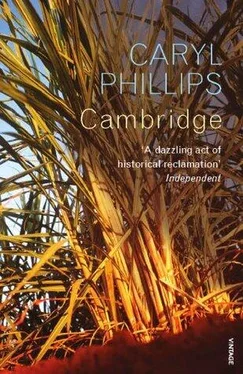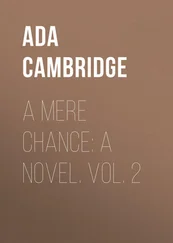Caryl Phillips - Cambridge
Здесь есть возможность читать онлайн «Caryl Phillips - Cambridge» весь текст электронной книги совершенно бесплатно (целиком полную версию без сокращений). В некоторых случаях можно слушать аудио, скачать через торрент в формате fb2 и присутствует краткое содержание. Год выпуска: 2009, Издательство: Vintage Digital, Жанр: Современная проза, на английском языке. Описание произведения, (предисловие) а так же отзывы посетителей доступны на портале библиотеки ЛибКат.
- Название:Cambridge
- Автор:
- Издательство:Vintage Digital
- Жанр:
- Год:2009
- ISBN:нет данных
- Рейтинг книги:5 / 5. Голосов: 1
-
Избранное:Добавить в избранное
- Отзывы:
-
Ваша оценка:
- 100
- 1
- 2
- 3
- 4
- 5
Cambridge: краткое содержание, описание и аннотация
Предлагаем к чтению аннотацию, описание, краткое содержание или предисловие (зависит от того, что написал сам автор книги «Cambridge»). Если вы не нашли необходимую информацию о книге — напишите в комментариях, мы постараемся отыскать её.
Cambridge — читать онлайн бесплатно полную книгу (весь текст) целиком
Ниже представлен текст книги, разбитый по страницам. Система сохранения места последней прочитанной страницы, позволяет с удобством читать онлайн бесплатно книгу «Cambridge», без необходимости каждый раз заново искать на чём Вы остановились. Поставьте закладку, и сможете в любой момент перейти на страницу, на которой закончили чтение.
Интервал:
Закладка:
On completion of this interlude, Mr Rogers replaced upon the table a piece of bread that was already half-way lifted to his mouth, and sought clarification from Mr McDonald that he had understood him correctly. He claimed that our physician, this same man who appeared to be defending the blacks, was one who had frequently spoken otherwise of our darker brethren. Mr McDonald smiled, and then prepared to defend himself, first by restating briefly his opinions upon the white populace in case there should have been any misunderstanding of his position. 'In short, our islands have become the midden for the detritus of the parent country.' At this point Mr McDonald paused for effect, and then continued. 'But this is not totally the fault of the white arrivant. Constant association with an inferior race will weaken the moral fibre of a white man and debase the quality of his life. A mere glance should be sufficient to convince an observer that the West Indian negro has all the characteristics of his race. That he steals, lies, is witless, incompetent, irresponsible, habitually lazy, and wantonly loose in his sexual behaviour, is apparent to even the most generous of those who would take sambo's part. It is only the dread of corporal punishment which keeps these incorrigible thieves in order. To each other they display unimaginable cruelty, and when they fight they are particularly adept at kicking and biting. All attempts at mental instruction having failed, it is to be regretted that only a hearty laying on of that hateful implement, the whip, will rid them of their rebellious thoughts.'
I listened intently, and observed Mr Rogers nodding in agreement with some of what the doctor prescribed. Mr McDonald went on and claimed that the clearest evidence of West Indian moral turpitude was to be found in the social evil of miscegenation, a practice contrary to the Anglo-Saxon nature, and one that gave rise to a sub-species of hybrid. Some white men, though considering negroes little more than beasts of burden, had no objection to making these negroes partners of their illicit intercourse, and then condemning the issue of such unions to shame and degradation. The female offspring invariably take the name of housekeeper and in turn become the mistresses of white men, while the male offspring merely drag out an existence as scarcely tolerated spaniels permitted to lick the feet of their masters, but just as likely to be kicked out of doors on a whim. The mothers of such children face an even worse destiny, having been used by degenerate Englishmen who no doubt simply came to make a quick fortune and return rejoicing at their success. Such women are abandoned with little to sustain them socially but the significance given their litter's skin, and seldom even the most meagre of allowances. These dingy women may soon grow fat upon the bread of prostitution, and when their bodies become diseased, and their constitutions weakened by dissipation and excess, their sources of support fail, and the curse of poverty falls hard and heavy upon the afflictions of decrepit age. Their lot, truly, is wretched, more so when one considers that in the tropics, unlike England, immorality is impossible to conceal, for all is known and speedily rumoured abroad.
I must concede that there followed a few moments of silence. Both men appeared to wonder if their talk had not gone too far and had, perhaps, angered me. For my own part I felt privileged to have witnessed such a debate between two responsible men, one clearly dominant over the other and likely to win any argument by force of personality, the other gifted with a more temperate spirit, but unable to stem the tide raging against him. Mr McDonald added a coda to his argument, in a most witty and informative manner. The separation of castes in India, he claimed, is not more formally observed than the careful division of shades in the tropics caused by indulgence in this miscegenation, or race-mixing. The offspring of a white man and a black woman is a mulatto; the mulatto and the black produce a sambo; from the mulatto and white comes the quadroon; from the quadroon and the white the mustee; the child of a mustee by a white man is called a musteefino; while the children of a musteefino are free by law, and rank as white persons to all intents and purposes.
Mr McDonald's careful definitions caused some much-needed laughter all around. The divers black attendants, who had been audience to all that we had said, brought forth the Bristol beer and punch, along with dishes of tea. To a person they displayed the virtuous animal fidelity of the dog. Mr Rogers seemed anxious to leave our contentious zone of discussion. He therefore turned the conversation upon Mr McDonald's work, and skilfully diverted it from any scrutiny of his own duties within the Church.
He inquired of Mr McDonald if he had explained to me the nature of a physician's responsibilities, and Mr McDonald asserted that he had done so. The doctor then informed us that he would gladly enlarge upon such of these responsibilities as might cause- us further amusement. He re-asserted that the hospital was crowded with patients who have little the matter with them, who can only diagnose their illness as a 'lilly pain here, massa', or 'a bad pain me somewhere, massa', and who evidently visit the sick-house only in order that they might idly sit and jabber away time with friends. Of the authentic negro diseases, chief among them would appear to be lameness. It is principally as a result of the chegoe, that ubiquitous diminutive fly which works itself into the feet to lay its eggs, and, if not carefully and swiftly extracted, will corrupt the flesh around it. It seems the negroes are all provided with small knives for the purpose of extracting the chegoe, but as no pain is felt until the sore is produced, the extreme laziness of the negro frequently leads them to neglect this simple precaution. As a result dirt will enter the wound and make it difficult to obtain a cure. (Sometimes the black will go lame for life.)
The good doctor's general point about negro illness related to their cowardice. Mr McDonald asserted that in the matter of bodily pain it was not possible to be more craven than the sooty brethren. At the mere application of a poultice to a finger, or some such trifle, strong young bucks often cry out with tears running down their faces as though suffering amputation. At the conclusion of this ordeal the progeny of Afric's despised inhabitants are wont to clap their horny hands together, and, of a sudden, white grinders will shine bright from their black visages. This dread of medical treatment often leads them to conceal real disease, and such cowardice carries off many negroes each season. With this' final observation of negro life our good doctor, having satisfied his thirst and filled his belly, hauled himself to his feet. He bade us farewell, and declared that once he had attended to his duties on a nearby estate he would send back the carriage for his friend.
Mr Rogers and I retired to the piazza, where we were able to view the good doctor riding off to repair the negroes of another owner. I felt sure that if I listened closely I might hear Mr Rogers whispering a prayer for their salvation. I looked across at Mr Rogers, having already conceived a design by which I might extract further information from our man of the cloth as to the fate of Mr Wilson and how he came to be replaced by the uncivil Mr Brown. The first strategy of this programme involved enquiring after and then listening to his deliberations upon his fellow members of the Church. His answers proved to confirm what I had suspected, that those in tropical holy orders are often lacking in both learning and piety, and serve as models of ill-conduct. Some are quite addicted to lewdness, drinking and gambling. Indeed, Mr Rogers suggested that some were better qualified to be retailers of salt-fish, or boatswains, rather than ministers of the Gospel. As to the reasons for this, they are two-fold. Firstly, tithes are customarily paid with produce of a decidedly inferior sort. Accordingly, emoluments vary considerably from year to year, but are never sufficient to support the superior churchman. As to the second reason, it would appear that the planters have little or no religion. The making and maintenance of money is their God, and the expenditure of time and thought upon religious subjects is deemed 'bad business'. Naturally enough, the ambitious or able minister is unlikely to be attracted to this tropical region.
Читать дальшеИнтервал:
Закладка:
Похожие книги на «Cambridge»
Представляем Вашему вниманию похожие книги на «Cambridge» списком для выбора. Мы отобрали схожую по названию и смыслу литературу в надежде предоставить читателям больше вариантов отыскать новые, интересные, ещё непрочитанные произведения.
Обсуждение, отзывы о книге «Cambridge» и просто собственные мнения читателей. Оставьте ваши комментарии, напишите, что Вы думаете о произведении, его смысле или главных героях. Укажите что конкретно понравилось, а что нет, и почему Вы так считаете.












